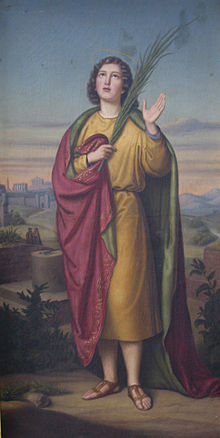Pancras of Rome
| Pancras of Rome | |
|---|---|
 |
|
| Martyr | |
| Born | c. 289 Synnada |
| Died | 12 May, 303-304 (aged 14) |
| Venerated in | Roman Catholic Church |
| Major shrine | San Pancrazio, Rome, Italy |
| Feast | May 12 |
| Attributes | Roman legion armor, martyr's palm branch, book, quill, sword |
Saint Pancras (Latin: Sanctus Pancratius) was a Roman citizen who converted to Christianity, and was beheaded for his faith at the age of fourteen, around the year 304. His name is Greek and literally means "the one that holds everything".
From an early stage, Saint Pancras was venerated together with Saints Nereus and Achilleus in a shared feast day and Mass formula on 12 May. In 1595, 25 years after Pope Pius V promulgated the Tridentine Missal, Saint Domitilla was also added.
Since 1969, Saint Pancras has been venerated separately, still on 12 May. He is, traditionally, the second of the Ice Saints.
Because he was said to have been martyred at the age of fourteen during the persecution under Diocletian, Pancras would have been born around 289, at a place designated as near Synnada, a city of Phrygia Salutaris, to parents of Roman citizenship. His mother Cyriada died during childbirth, while his father Cleonius died when Pancras was eight years old. Pancras was entrusted to his uncle Dionysius' care. They both moved to Rome to live in a villa on the Caelian Hill. They converted to Christianity, and Pancras became a zealous adherent of the religion.
During the persecution of Christians by Emperor Diocletian, around 303 AD, he was brought before the authorities and asked to perform a sacrifice to the Roman gods. Diocletian, impressed with the boy's determination to resist, promised him wealth and power, but Pancras refused, and finally the emperor ordered him to be beheaded on the Via Aurelia, on 12 May 303 AD; this traditional year of his martyrdom cannot be squared with the saint's defiance of Diocletian in Rome, which the emperor had not visited since 286, nor with the mention of Cornelius (251-253) as Bishop of Rome at the time of the martyrdom, as the most recent monograph on Pancras' texts and cult has pointed out.
...
Wikipedia
